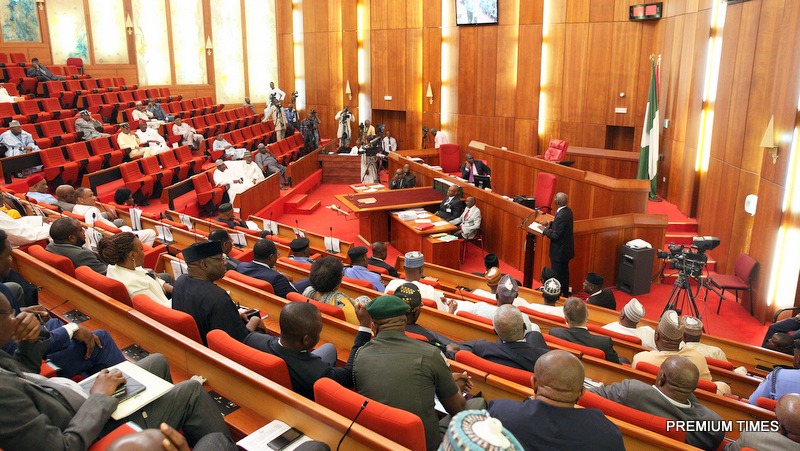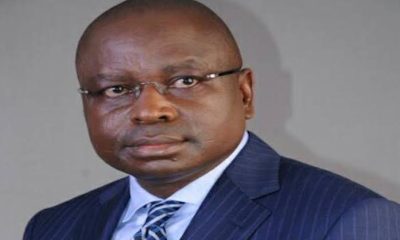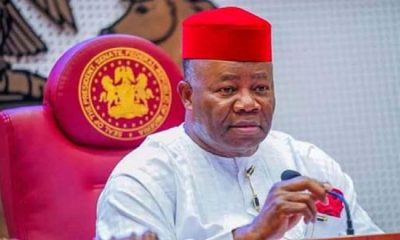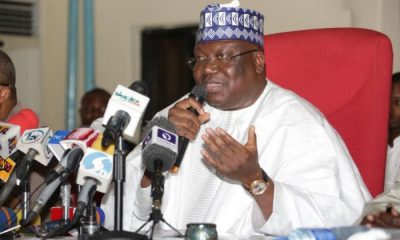NEWS
Nigerian Senators divided on regional government return

Nigerian Senators from the southern and northern regions have expressed opposing opinions on the movement to return to a regional administration system.
They expressed their views on the fringes of a two-day retreat on revisions to the 1999 Constitution, which the Senate Committee on Constitution Review, in partnership with the Policy and Legal Advocacy Centre (PLAC) of Kano, held.
While senators from the northern region were adamantly opposed to the concept, those from southern Nigeria saw it as a positive development that would boost the economy, combat insecurity, and speed infrastructure development.
However, Senate Leader Opeyemi Bamidele informed Nigerians that the topic of regionalism was not included in the present constitution review.
Abdul Ningi, a ranking senator from Bauchi Central Senatorial District, told journalists that his constituents would never approve the plan because they had no experience with growth while the system was in place during the defunct First Republic.
Ningi stated, “I’ve heard a lot about regional government and federalism, and I’ve heard people advocating for these notions.
“For a start, no matter how you see it, the current document (1999 Constitution) is still the grundnorm. It has also stipulated how it is going to be amended.
“Having said that, it is also imperative to know that it isn’t just enough for anybody to come and say they are the representative of one ethnic group or another at the National Assembly.
“The question that arises is: when was this mandate canvassed? When was it received? You are a representative of a particular ethnic group in Nigeria, at what time were you given the mandate to canvass that?
“The only people that are given this mandate to look at the Constitution and amend it are, of course, members of the National Assembly.
“Therefore, it is important for those who go about selling these ideas, false ideas in my opinion, that they are representatives of the people, to let Nigerians know where they are coming from, on whose mandate, and when was this mandate given to them.
“We have seen how the regional government was operated in the past. My part of the country that I am representing didn’t enjoy the development of that so-called regional government that was based in Kaduna.
“We aren’t going back there again! I am speaking for my senatorial district. It is either the Nigerian Federation or nothing. We can’t go along; my senatorial district will be satisfied independently with Nigeria, if that is what is required.
“As far as regional government is concerned, my constituency, my people aren’t for it. What we need is reform of the current Federal Government structure and fiscal federalism because there is nothing like true federalism.”
Senator Sani Musa, Chairman of the Senate Committee on Finance, warned Nigerians not to confuse the formation of zonal development commissions with regionalism.
He stated that the numerous geopolitical zonal development commissions existed solely to promote the social and economic development of their respective areas.
He said, “It is wrong for anybody to think that the development commissions being established for the six geopolitical zones are a plan towards regionalism. It is not.
“Those who are advocating for it should come up with bills through their representatives in the National Assembly and test the popularity of their proposal.”
Similarly, former Senate Leader Ali Ndume stated that the concept of true federalism had fallen out of favor in many African countries.
He called for the establishment of strong institutions to promote good governance and combat corruption and instability.
“When the government puts these in place, there won’t be clamour for true federalism because there will be justice, equity, and fairness in all regions of the country.”
Senator Muntari Dandutse, who represents Katsina South Senatorial District, disagrees with the proponents of regional governance.
He stated that the purpose of the ongoing retreat was to improve on the flaws and abnormalities found in the country’s constitution throughout the years.
He said, “We should not have myopic thinking about ourselves. There is no section of this country that is not blessed.
“What is important is that we should have good governance and credible and responsible access to the resources that we have because Nigeria is blessed.
“We have all the comparative advantages that will move this country forward unless, of course, we are serious and determined.”
Senator Abdulfatai Buhari, who represents the Oyo North Senatorial District, disagreed with those who condemned the regional form of governance.
Buhari said, “Recall that the regions were able to harness their resources in the First Republic.
“We were able to harness all our resources. There was no dominance of particular resources.
“In those years, the North was known for the groundnut pyramids, the South West for cocoa. We should be able to do that.
“When you make the center less attractive, you cut off corruption. You can’t wipe it off, but you can cut it down, because there is what is called ‘watch your team.’ People will watch their team within their locality or within their region.”
When asked if the South West region had a specific agenda for the ongoing constitution review, Buhari responded that it would be addressed at the appropriate time.
He said, “We don’t want to disclose that agenda yet, but we have agreed among ourselves that the person who will present it is the Chairman of the South West Forum when the time comes. It would be very unfair for me now as a member to start discussing that.”
However, the Senate Leader highlighted that a constitutional modification would not change the issue of regionalism.
He said, “There are some decisions in the state where an executive bill cannot come to the parliament unless there is some political consensus.
“For me, going back to a regional form of governance is something that will go beyond a bill being sponsored, either as a member’s bill or as an executive bill.
“It’s also not something that you sit down in a public hearing room and organize a public hearing to take a decision on.
“An example is when people say, ‘Oh, you are in parliament. As a parliament, you cannot discard the entire constitution. Nigeria needs a new constitution because this one cannot work.’
“It’s easy for people to make such arguments, but that is not something we can sit down in parliament and do.
“We aren’t changing the constitution because that would require political consensus, and it would also require the buy-in of the Nigerian people themselves.
“Why is it so difficult to amend even one section of the constitution, let alone discard the entire constitution?
“To amend a single provision in the constitution today, the National Assembly and all chambers have to go through this entire process, which we go through in every legislative assembly, and many of you have been a part of this process.”













